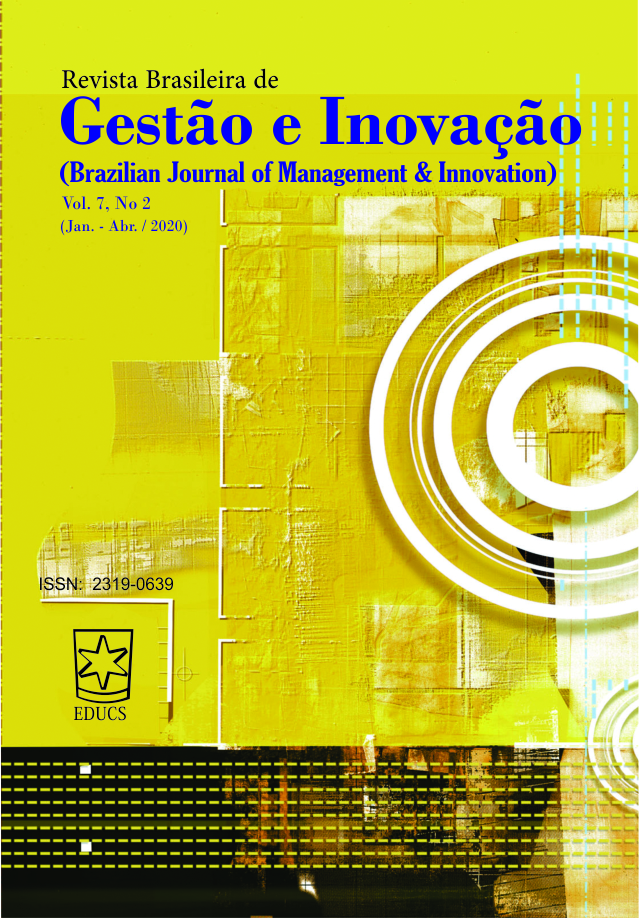GAMIFICAÇÃO: UMA ANÁLISE BIBLIOMÉTRICA DE ARTIGOS CIENTÍFICOS PUBLICADOS ENTRE 2008 E 2018 | GAMIFICATION: A BIBLIOMETRIC ANALYSIS OF SCIENTIFIC ARTICLES PUBLISHED BETWEEN 2008 AND 2018
Keywords:
Gamificação, Jogo, Bibliometria.Abstract
A gamificação consiste no uso de técnicas de design de jogos orientadas a contextos normalmente não relacionados a jogos, como o organizacional, para estimular o engajamento e a motivação entre os funcionários e para manter e atrair novos clientes. Trata-se de um tema ainda recente na pesquisa acadêmica, o que justifica estudos nessa área. Diante disso, este artigo buscou analisar de que forma a temática em questão impactou a pesquisa acadêmica no período de 2008 a 2018. Para isso, desenvolveu-se um estudo bibliométrico nas bases de dados Scopus e Web of Science, tendo como critérios de análise os artigos mais citados, os autores da área (e sua relevância) e as principais revistas científicas que publicaram estudos sobre o assunto. Foram identificados 14 artigos publicados na base Web of Science desde 2015 e 34 artigos publicados na Scopus desde 2012. O artigo “Is it all a game? Understanding the principles of gamification”, dos autores Robson, Plangger, Kietzmann, McCarthy e Pitt (2015), possui a maior quantidade de citações em ambas as bases de dados. Além disso, os resultados permitem afirmar que a gamificação proporcionou um impacto limitado na realidade das pesquisas acadêmicas, mas possibilitou analisar o tema em questão e seus construtos, gerando mais informações e contribuindo para a área.
DOI: 10.18226/23190639.v7n2.08
Daniel Hank Miri, Universidade de Caxias do Sul (UCS). Brasil.
E-mail: dhmiri@ucs.br
Paula Patricia Ganzer, Centro de Ensino Superior Cenecista de Farroupilha (CNEC). Brasil.
E-mail: ganzer.paula@gmail.com
Juliana Matte*, Universidade de Caxias do Sul (UCS). Brasil.
E-mail: ju.cxs1@gmail.com
Cassiane Chais, Universidade de Passo Fundo (UPF). Brasil.
E-mail: cassichais@gmail.com
Pelayo Munhoz Olea, Universidade Federal do Rio Grande (FURG). Brasil.
E-mail: pelayo.olea@gmail.com
Submetido: Março 2019
Aceito: Maio 2019
*Contato para Correspondência
Downloads
Published
How to Cite
Issue
Section
License
The author must guarantee that:
- there is full consensus among all the coauthors in approving the final version of the document and its submission for publication.
- the work is original, and when the work and/or words from other people were used, they were properly acknowledged.
Plagiarism in all of its forms constitutes an unethical publication behavior and is unacceptable. Revista Brasileira de Gestão e Inovação has the right to use software or any other method of plagiarism detection.
All manuscripts submitted to RBGI - Revista Brasileira de Gestão e Inovação go through plagiarism and self-plagiarism identification. Plagiarism identified during the evaluation process will result in the filing of the submission. In case plagiarism is identified in a manuscript published in the journal, the Editor-in-Chief will conduct a preliminary investigation and, if necessary, will make a retraction.
This journal, following the recommendations of the Open Source movement, provides full open access to its content. By doing this, the authors keep all of their rights allowing Revista Brasileira de Gestão e Inovação to publish and make its articles available to the whole community.
RBGI - Revista Brasileira de Gestão e Inovação content is licensed under a Creative Commons Attribution 4.0 International License.
Any user has the right to:
- Share - copy, download, print or redistribute the material in any medium or format, linking to RBGI site.
- Adapt - remix, transform and build upon the material for any purpose, even commercially.
According to the following terms:
- Attribution - You must give appropriate credit, provide a link to the license, and indicate if changes were made. You may do so in any reasonable manner, but not in any way that suggests the licensor endorses you or your use.
- No additional restrictions - You may not apply legal terms or technological measures that legally restrict others from doing anything that the license permits.
#RBGI







